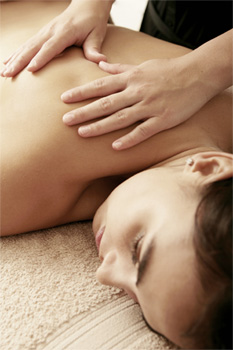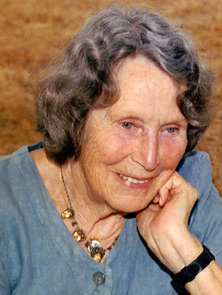Rosen Method® Bodywork
Rosen Method® bodywork is an holistic process addressing the body, mind and spirit. The nature of this work is simple, gentle, and non-intrusive; while the power and effectiveness of Rosen Method® is profound. Rosen Method®, on its own or as a complement to other health care modalities, has a transformative effect on body and mind, and brings balance and ease into one's life.
"Relaxation is the gateway to awareness." – Marion Rosen 
People Who Benefit From Rosen Method®:
Have physical pain and discomfort
Have muscle tension and postural problems
Have chronic stress
Feel overextended
Want to increase their ease in physical activity
Are looking for physical, emotional and spiritual growth
Use their bodies for self-expression (athletes, public speakers, performers)
Are receiving psychotherapy
"Often the hands will solve a mystery that the intellect has struggled with in vain." – Carl Jung
Theory
The theory of Rosen Method® is that we shape and form ourselves according to our life's circumstances and experiences. Body posture, too, is formed around the need for protection or guarding. The body reveals the story of a person's life.
Unexpressed and unresolved feelings and emotions get held in the body through muscle tension. Tightly held muscles literally hold us back in life. Chronic muscular tension, which once served as protection, often becomes a barrier, limiting full expression of our aliveness. Eventually, the tension becomes part of our expressions, movements and postures. We only feel the tension if it becomes painful. The effort it takes to hold our muscles in protective or guarded ways takes an enormous amount of energy. We also use our breath as a way to control our feelings.
What Happens During A Session
Rosen Method® bodywork uses gentle, direct touch with hands that listen rather than manipulate. The practitioner's touch focuses on areas of chronic muscle tension bypassing the thinking mind and allowing the client to attain a state of embodied self-awareness. This is a state of awareness, in the present moment, when the client may become aware of body sensations and emotions/feelings. Neuroscience research has shown that when our state of embodied self-awareness is activated there are regulatory centers in the brain that become activated which promote restorative changes in hormonal, respiratory, cardiovascular, and immune systems of the body.
During a Rosen bodywork session unconscious feelings, attitudes, and memories may emerge. The practitioner responds using touch and words that allow the client to begin to recognize what has been held down by their unconscious muscle tension. Habitual muscle tension and repressed emotions may be released allowing the client to experience a greater sense of freedom and a renewed sense of well-being. This bodywork addresses the unconscious muscular holdings in the body (including the diaphragm) allowing the release of muscular tension and creating the opportunity to heal.
Practitioner Training
Rosen practitioners, as part of their training, work through much of their own psychological baggage. They are not trained as therapists, nor do they engage in therapy with their clients. They are trained to be proficient observers and listeners: listening to the body and what it has to say in a compassionate, non-judgmental way while being very present in the moment with a heightened sense of awareness.
Rosen Method® is an effective complement to psychotherapy, medical treatment, and alternative treatment modalities. It can be a powerful tool for re-establishing the mind, body and spirit connections.
"This work is about transformation – from the person we think we are to the person we really are." – Marion Rosen

Rosen Method® Bodywork Rates
One hour - $150.

Payment Options
Cash, personal checks and credit cards are also accepted at the time of your appointment.

Gift Certificate
You can order online. Gift certificates are available in any denomination.

New Client Forms
Download to save time
|
Marion Rosen
Founder of Rosen Method®
(1914 – 2012)
Marion Rosen was born in Nuremberg, Germany in 1914. She was born into a moderately affluent family; and had been raised to believe that she would never have to earn a living because her father was well off financially. Everything changed when Hitler and the Nazi party rose to power during her teenage years. During this time she suffered a multitude of losses, including the loss of many friends and a dearly loved boyfriend (they were all gentile). She wasn't allowed the opportunity to go to university, and was forbidden to go to movies or restaurants. Her family lost their wealth to the Nazis. Marion felt confused by all the barriers, because although she was Jewish by birth, she was raised Lutheran. Due to all the enforced limitations, Marion was unclear about how she would be able to earn a living.
In the 1930's, quite by happenstance, Marion met Lucy Heyer who practiced a type of relaxation massage and breathwork. Lucy invited Marion to study with her as her apprentice for two years in Munich, Germany. Lucy Heyer worked with her husband, Dr. Gustav Heyer, a colleague and former student of Carl Jung. They worked along with a group of other students and colleagues of Carl Jung. The experimental work they were doing, at the time, was to determine if it would be beneficial to have their patients receive relaxation massage and breathwork in addition to psychotherapy. Lucy and Marion did relaxation massage and breathwork on patients who then saw Dr. Heyer for psychotherapy. They found that with the bodywork the patients were able to experience their emotions more easily and they progressed more rapidly in their psychotherapy.
Because of her Jewish origins, Marion had to flee Germany. She went to Sweden to await her visa to America. During that time she trained as a physical therapist. She came to America in 1940, and settled in Berkeley, California. She attended the Mayo Clinic to obtain her license as a physical therapist in the USA. For many years she worked as a physical therapist, first at Kaiser Medical Center and then in private practice.
Marion developed Rosen Method® movement in the mid-1950's as a response to her patients' interest in finding ways to prevent injury and keep their bodies healthy and mobile. This is a gentle form of exercise based on range-of-motion exercises from physical therapy along with dance elements put to music. It can be modified for all levels of physical abilities; and is beneficial as rehabilitative or restorative exercises.
Rosen Method® bodywork developed over the years that Marion practiced physical therapy. Marion noticed that clients who talked about their lives and recalled what was happening at the time of their injuries recovered more quickly and did not come back again with the same problems. She observed the interconnections between the physical posture and the emotional state of the person. She saw how the body is a living metaphor of a person's inner state.
In the mid-1970's Marion began to teach and draw more specifically on her early training in Germany using relaxation and breathwork. As the body/mind renaissance flourished in California, students were drawn to Marion and her gentle, powerful work. Eventually, the Rosen Institute was formed and Rosen Method® training centers have been established internationally. Rosen Method® is a powerful complementary healing therapy and is now a recognized modality for somatic exploration and personal growth. Marion's purpose was to realize a vision of health and well-being by making the benefits of the Rosen Method® widely available to the general public. Through her unique approach to bodywork and movement, she has gained recognition as a leader and originator in the field of body-oriented therapies.
In January, 2012, Marion Rosen passed away and left us with the great gift of Rosen Method®. The legacy of Marion Rosen's lifetime of work has planted seeds for the future. Her enduring gift to humanity lives on through many hands. This "simple touch" reaches the heart and soul of each of us allowing the sense of peace, love and acceptance to be remembered deep in the essence of who we are. |

